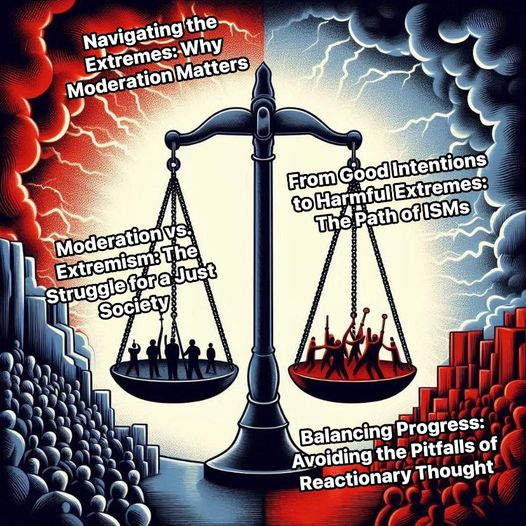
Over the past 200 years, various ideologies—such as communalism, fascism, socialism, terrorism, Zionism, and feminism—have emerged. These “ISMs” often arise from reactionary mindsets influenced by specific viewpoints. A close examination reveals that when individuals become deeply entrenched in these reactionary ideas, the complexities and delicate balance of human life can be overshadowed.
What gives rise to such reactionary mindsets? They often emerge from negative human experiences and attitudes. For instance, after the death of Prophet Muhammad (PBUH), the caliphate was expected to follow his model of governance. However, over time, internal conflicts escalated into violent clashes. This led to the rise of the Khawarij, a group of devout individuals who became so disillusioned that they called for the abolition of government altogether. They argued that all violence stemmed from governmental systems and believed society could function without a centralized authority. Although their intentions—to foster honesty and self-governance—were well-meaning, their approach was extreme and reactionary.
Similarly, many of other ideologies begin with valid concerns. Communism, for instance, emerged as a response to the exploitation of laborers and the concentration of wealth. Its advocates proposed collectivizing production to eradicate greed and injustice. However, in practice, this philosophy led to oppression and distortions of human nature.
Fascism promised national unity and strength under a powerful leader but resulted in devastating consequences. Feminism, while rightly addressing historical oppression and inequality faced by women, has, in some instances, swung to extremes that impact fundamental institutions like the family.
Zionism, which aimed to address the rights of Jewish people, led to ongoing conflict and suffering in the Middle East. Although it sought to create a safe haven for Jews free from persecution, the establishment of Israel in 1948 displaced Palestinians living on the land, creating a new cycle of violence and displacement. The Zionist movement, intended to remedy Jewish suffering, inadvertently caused new injustices for Palestinians.
The issue with reactionary ideologies is their tendency toward extremism. Radical ideas often lead to rigid doctrines that, rather than advancing justice, cause significant harm. When these ideologies are rooted in religion, holy scriptures are sometimes taken out of context to justify atrocities in the name of justice. This highlights the need for moderation; while ideologies can drive necessary change, they must be grounded in balance and fairness. All such schools of thought or “ISMs” have the potential to become extreme, and when they do—whether as “ISMs” or other ideologies—they create rigidity in thought and governance that ultimately harms humanity. The family, as a fundamental social institution, is particularly vulnerable to these disruptions. Instead of fostering a just society, these ideologies often lead to oppression, injustice, and the forceful imposition of beliefs on others. Such misguided views of human nature often result in harm rather than progress. While people may believe they are building a paradise on Earth, history has shown that the world often celebrates when these rigid systems collapse.
To address injustices—whether they involve gender, governance, the oppression of a group, or economic inequality—change must be pursued with moderation. Sudden, extreme shifts often come at a great cost, leading to loss of life and the destruction of communities. Movements should be driven by well-considered, balanced agendas, steering clear of rigid and reactionary paths that often cause suffering. It is crucial to avoid intellectual chaos at all costs. Transforming mindsets through education and enacting new laws are essential steps, but without moderation and balance, one ideology can push you to one extreme while another pulls you in the opposite direction, like a pendulum. Injustice and oppression are issues that affect all of humanity, not just a particular gender, group, or nation.

